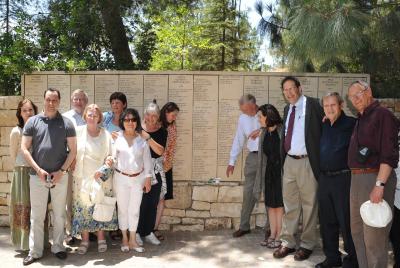10 June 2010
Some 30 Holocaust survivors from Israel, Germany, the United States, France and Canada who survived the Holocaust thanks to Righteous Among the Nations Maj. Karl Plagge visited Yad Vashem yesterday. The group toured the Holocaust History Museum before participating in a memorial ceremony in the Hall of Remembrance and an event in the Yad Vashem Synagogue. Also this week, Yad Vashem videoed their group testimony, as part of Yad Vashem project to record survivors' testimony.
Major Karl Plagge served as an officer of the Wermacht in Vilna (Vilnius) from June 1941 to June 1944. While stationed in Vilnius he was in charge of a repair facility for military vehicles (HKP 562), where hundreds of Jews worked. According to the brutal decimation policy adopted by the SS in occupied Lithuania, the first to be slated for extermination were the “unproductive” Jews. Employment at Plagge’s HKP unit thus offered a chance for survival. Plagge treated his workers well, and included many people who were not qualified as mechanics to work there in order to save them from deportation; among the Jews of Vilna it was known that if one wanted a chance to survive, the only option was to work in Plagge’s plant. In the last days of June 1944, on the eve of the German evacuation of Vilnius, Plagge assembled his Jewish workers and warned them in thinly veiled language that they were going to be handed over to the care of the SS. Some managed to escape and/or hide and some 200 survived. Karl Plagge died in 1957 and was posthumously recognized by the Commission for the Designation of the Righteous on July 22, 2004.
Holocaust survivor Michael Shimeyvitz, noted that Plagge not only saved Jews, but "he treated all his workers humanely. This was extremely rare, and for this, justifiably, he received the greatest recognition that the Jewish people can give."
Dr. Michael Good, the son of a Holocaust survivor who was rescued by Maj. Plagge, noted that while Maj. Plagge was exonerated after the war due to the intervention of the Jews he rescued, he always felt that he was guilty. He quoted a letter from Maj. Plagge, in which the Major wrote: "I am no kind of hero; I am actually a very nervous person."
Dr Harald Kindermann, Ambassador to Israel of Germany spoke emotionally about his personal family history, and said that there are two obligations -- to understand what happened -- "Only through understanding, knowing the facts, can we build a firewall to ensure it won't happen again. That is why the Yad Vashem research institute is so important." -- and to recall the Righteous Among the Nations. "They are so important for education. They show us that there is an alternative. Because too many people say, I had to do it. And when young people ask, is that true, the Righteous show us it was not. They show us there is always an alternative."







